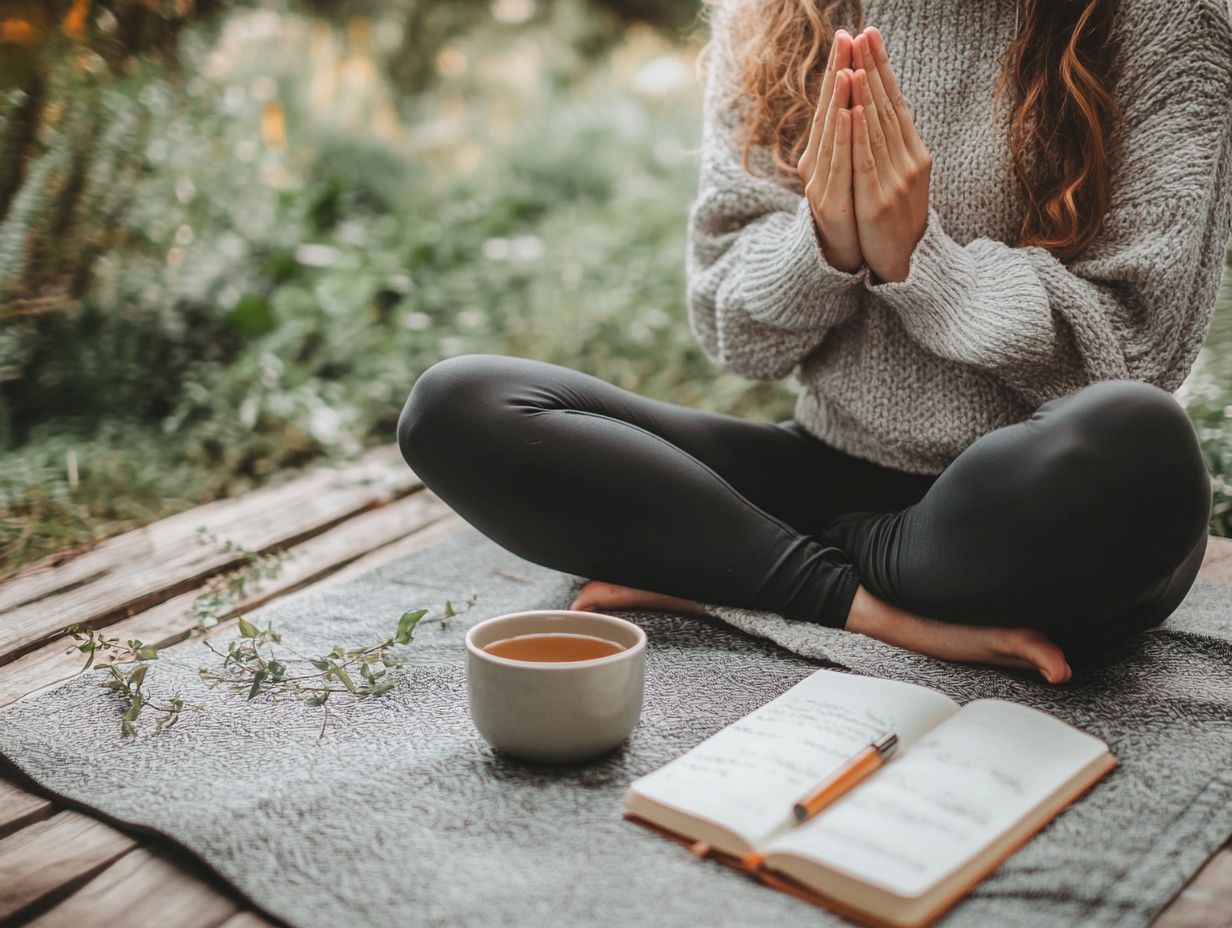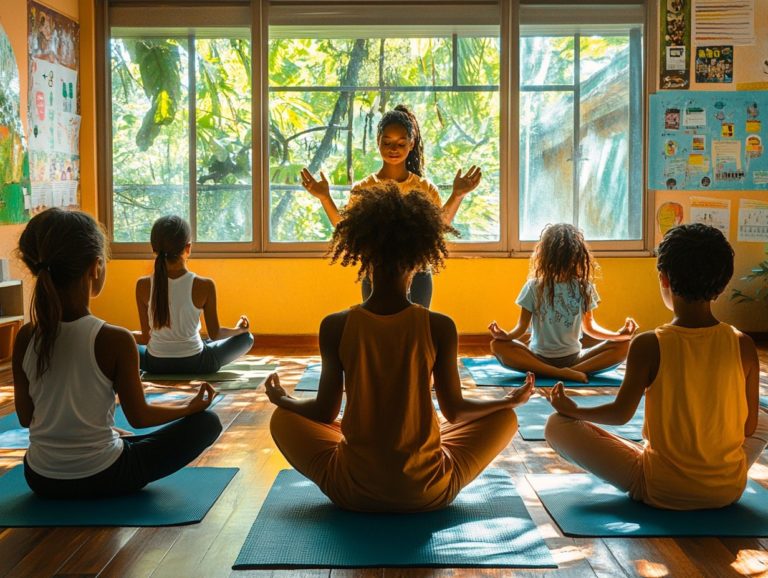5 Ways to Practice Gratitude Daily
In a fast-paced world often brimming with stress and negativity, practicing thankfulness can be a powerful habit that significantly enhances both your mental and physical well-being.
This exploration unveils five simple yet powerful ways for you to weave gratitude into your daily routine, ranging from maintaining a gratitude journal to expressing heartfelt thanks to those around you. You’ll uncover the myriad benefits of gratitude, including its profound impact on mental health and effective stress management, while addressing common barriers you might encounter and strategies to overcome them.
Embrace gratitude it’s time to elevate your life!
Contents
- Key Takeaways:
- 1. Keep a Gratitude Journal
- 2. Write Thank-You Notes
- 3. Practice Mindful Gratitude
- 4. Express Gratitude to Others
- 5. Reflect on the Good Things in Your Life
- How Does Practicing Gratitude Benefit Your Mental Health?
- What Are Some Simple Ways to Incorporate Gratitude into Your Daily Routine?
- How Can Gratitude Help with Coping with Stress and Anxiety?
- What Are the Physical Benefits of Practicing Gratitude?
- How Can Gratitude Improve Relationships?
- What Are Some Common Barriers to Practicing Gratitude and How Can They Be Overcome?
- Frequently Asked Questions
Key Takeaways:

Keep a gratitude journal to reflect on the good things in life. Write thank-you notes or show kindness to express gratitude. Make gratitude a daily habit through mindfulness.
1. Keep a Gratitude Journal
Keeping a gratitude journal is a powerful habit that helps you feel better emotionally by prompting you to reflect on and truly appreciate the positive aspects of your life. This ongoing reflection leads to enhanced mental health and resilience over time.
This simple yet effective technique not only helps you acknowledge your daily experiences but also acts as a remarkable tool for boosting your self-esteem and fostering a more optimistic outlook. By regularly documenting your moments of gratitude be it through daily entries, gratitude lists, or reflective writing you create a tangible record of positivity in your life.
Employing techniques such as listing three things you re thankful for or writing a brief reflection on a significant experience can deepen this practice even further. These methods sharpen your ability to recognize the good amidst challenges and reinforce your personal strength, ultimately leading to greater emotional resilience and a more fulfilling life.
2. Write Thank-You Notes
Writing thank-you notes is an incredibly powerful way for you to express gratitude, foster meaningful interactions, and enhance your emotional well-being. These small yet significant gestures can turn ordinary exchanges into memorable moments, reminding both you and the recipient of shared experiences.
Sending thank-you notes after interviews shows professionalism and keeps you memorable. Thanking a friend who supported you strengthens your bond and makes you both feel valued. To craft a heartfelt message, be specific about why you’re grateful, share how their actions positively impacted you, and include a personal touch to make it unforgettable.
3. Practice Mindful Gratitude
Practicing mindful gratitude means being aware of and appreciating the good things around you. Techniques like gratitude meditation can help you cultivate a deeper gratitude mindset, promoting present-moment awareness and appreciation for life s simple pleasures.
By integrating visualization practices where you imagine a positive moment or recall cherished memories you can foster a strong connection to your feelings of thankfulness. These techniques encourage a shift away from negative thought patterns, leading to improved mental health and resilience.
As you routinely immerse yourself in gratitude sessions, you may notice a gradual transformation in your overall outlook. This shift not only brightens your daily experiences but also equips you to handle stress and adversity with a renewed sense of optimism. Thus, these mindfulness practices become a cornerstone for cultivating lasting happiness and emotional stability in your life.
4. Express Gratitude to Others

Thanking others builds strong connections and a sense of belonging. It boosts your emotional well-being and encourages kindness.
There are countless ways to show appreciation, from simple verbal acknowledgments to thoughtful gestures. A kind word can brighten someone’s day, while a handwritten note adds a personal touch that resonates deeply.
When you express thankfulness, you uplift others and experience a boost in your own happiness. This natural exchange of gratitude creates a positive feedback loop, enhancing mental health for everyone involved. It fosters an environment where kindness and support thrive.
5. Reflect on the Good Things in Your Life
Reflect on the good things in your life. Simple practices like keeping a gratitude list can greatly improve your emotional well-being.
This act builds positive emotions and reinforces a rewarding gratitude practice.
You can elevate this experience by incorporating gratitude walks an easy way to connect with nature while acknowledging the good things surrounding you.
During these walks, take a moment to observe your surroundings. Savor the beauty that often goes unnoticed and connect these observations to memories that fill you with gratitude.
Over time, this engagement fosters a more optimistic mindset and builds resilience against daily stressors.
Ultimately, this leads to improved mental health and a more fulfilling life.
How Does Practicing Gratitude Benefit Your Mental Health?
Practicing gratitude offers profound benefits for your mental health. Research by experts like Robert Emmons highlights its role in enhancing emotional well-being and alleviating symptoms of anxiety and depression.
Emmons studies, along with positive psychologist Martin Seligman s work, show that regularly engaging in gratitude practices significantly boosts overall happiness and life satisfaction. For example, a landmark study revealed that individuals who kept a gratitude journal felt more optimistic, which improved their coping strategies during stress.
These findings indicate that gratitude eases negative emotions and nurtures a positive mindset. This approach helps you view challenges as growth opportunities, reinforcing the idea that gratitude is an effective tool for resilience.
What Are Some Simple Ways to Incorporate Gratitude into Your Daily Routine?
Incorporating simple gratitude habits into your daily routine can profoundly enhance your emotional well-being. Start by jotting down moments of appreciation or engaging in gratitude exercises.
Establish a gratitude journal dedicated to daily blessings or experiences that bring joy. This practice boosts your mood and cultivates a sense of abundance.
Take moments for gratitude reflections throughout your day during meals or just before bedtime. This encourages mindfulness and deepens your connection to the present.
If you seek inner peace, consider integrating gratitude meditation into your routine. This provides a centered space to acknowledge what you truly cherish, promoting a lasting appreciation that enhances your overall outlook.
Start your gratitude journey today for a happier, more fulfilling life!
How Can Gratitude Help with Coping with Stress and Anxiety?

Gratitude is an invaluable tool for managing stress and anxiety. It helps you focus on positive experiences and enhances your emotional well-being through mindfulness and appreciation.
Practices like gratitude meditation thinking about what you are thankful for and reflective journaling writing down your thoughts about those things can be woven into your daily routine. This shift nurtures a more optimistic perspective and reduces feelings of overwhelm that often accompany anxiety.
The psychological mechanisms driving this transformation activate the brain’s reward centers, reinforcing happiness and interrupting negative thought patterns. This creates space for positive emotions to thrive.
As you savor the present moment, the weight of worry and stress gradually lifts, bringing in a profound sense of calm. Imagine feeling lighter and more at peace! Gratitude can help you achieve just that.
What Are the Physical Benefits of Practicing Gratitude?
Practicing gratitude is more than just a feel-good exercise; it s linked to impressive physical benefits. You might find that it improves your sleep quality, enhances your immune function, and lowers your stress levels all contributing to your overall emotional well-being and resilience.
Studies reveal that when you regularly engage in gratitude practices, like keeping a gratitude journal or expressing thanks to those around you, you often report greater life satisfaction and measurable health improvements.
For example, if you take a moment each day to jot down three things you re thankful for, you re likely to experience fewer ailments. This highlights the profound connection between your mental state and physical health.
Even small gestures, such as sending thank-you notes, can help you forge stronger social ties. This, in turn, can boost your immune response and reduce inflammation levels. Collectively, these actions demonstrate how cultivating gratitude can lead to remarkable health benefits.
How Can Gratitude Improve Relationships?
Gratitude is essential for enhancing relationships. It nurtures emotional well-being and inspires expressions of appreciation that strengthen social connections and improve interpersonal dynamics.
When you acknowledge and appreciate the efforts of those around you, it creates a ripple effect that cultivates an environment where kindness and support flourish.
Simple gestures, like a sincere thank-you note, can brighten someone s day. Group activities focused on sharing gratitude, such as community gatherings, can forge stronger bonds among participants.
By cultivating a gratitude community, you enable connections rooted in shared values, leading to lasting friendships and a culture where appreciation becomes the norm. These expressions of gratitude reinforce relationships and lay the groundwork for resilience during challenging times.
What Are Some Common Barriers to Practicing Gratitude and How Can They Be Overcome?
Common barriers to practicing gratitude, such as negative thinking patterns and a lack of awareness, can hinder your emotional well-being. Recognizing these obstacles is your first step toward creating positive change.
Chronic stress or an obsession with imperfections may overshadow your ability to appreciate the good in your life. Engaging in mindfulness exercises helps you become more attuned to the present moment, allowing you to acknowledge the positives that often go unnoticed.
Practicing self-compassion treating yourself with kindness during moments of struggle can further ease your journey toward gratitude. Simple actions, like keeping a gratitude journal or taking a few moments each day to reflect on positive experiences, can make it easier to embrace a more grateful outlook.
Frequently Asked Questions

In this section, we ll address common questions about gratitude and its benefits. Learn how to incorporate gratitude into your life for improved emotional and physical health!
What are 5 ways to practice gratitude daily?
- Keep a gratitude journal: Write down three things you’re thankful for each day.
- Express gratitude to others: Tell someone how much they mean to you.
- Practice mindfulness: Take a moment to enjoy what’s happening right now.
- Help others: Helping others brings feelings of gratitude.
- Practice positive self-talk: Focus on the good in yourself and your life.
How can keeping a gratitude journal help?
A gratitude journal helps you reflect on the good things in your life. It encourages a daily habit of recognizing and appreciating positivity.
Why is expressing gratitude to others important?
Expressing gratitude shows others they are valued. This creates positivity and connection in your relationships.
How does mindfulness relate to gratitude?
Mindfulness helps us appreciate what we have. It allows us to focus on the little things we often overlook.
Can giving back really help with gratitude?
Yes! Helping others shows us our power to create positive change. It shifts our focus from ourselves to those in need.
How can positive self-talk practice gratitude daily?
Positive self-talk means recognizing the good in ourselves. This helps us appreciate who we are and what we’ve accomplished.
Ready to boost your happiness? Start your gratitude practice today!






